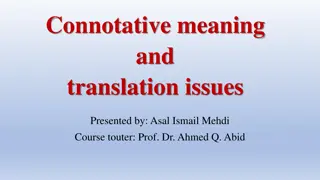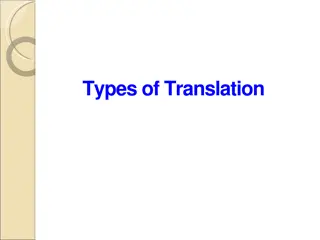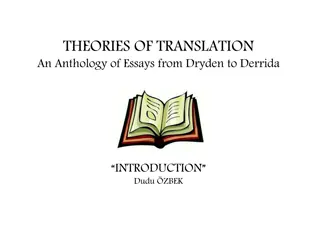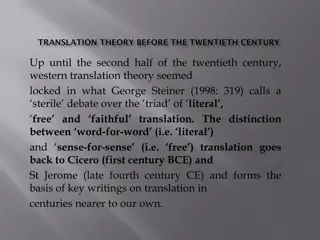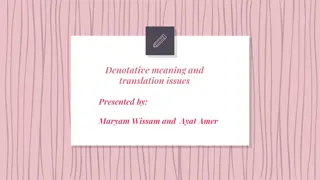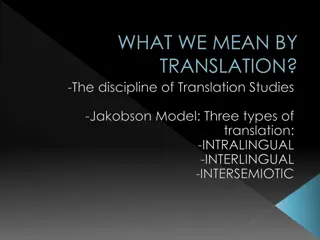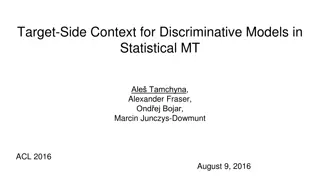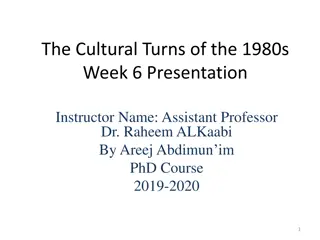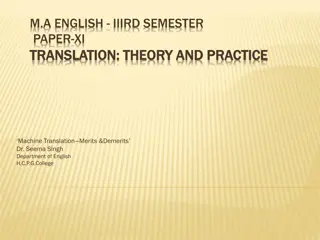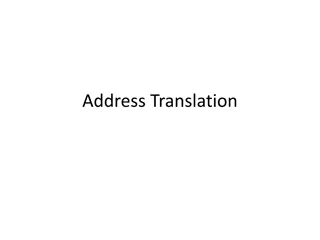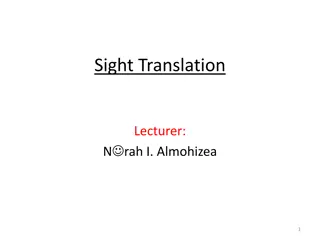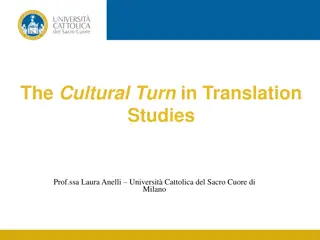Exploring Connotative Meaning and Translation Issues in Language
Delve into the nuances of connotative meaning through allusive, collocation, and reflected meanings. Discover how translation challenges arise due to cultural nuances and connotations, as exemplified by various expressions and word associations. Explore the significance of appropriate collocations in conveying the intended meaning accurately.
Download Presentation

Please find below an Image/Link to download the presentation.
The content on the website is provided AS IS for your information and personal use only. It may not be sold, licensed, or shared on other websites without obtaining consent from the author. Download presentation by click this link. If you encounter any issues during the download, it is possible that the publisher has removed the file from their server.
E N D
Presentation Transcript
Connotative Meaning And Translation Issue Presented BY Zahraa Uday Dharey Table of content: 1-Allusive meaning. 2-Collocation and collocative meaning. 3-Reflected meaning.
Allusive Meaning Allusive meaning is an intertextual feature. It occurs when an expression evokes an associated saying or quotation in such a way that the meaning of that saying or quotation becomes part of the overall meaning of the expression.
You are an owl In Arabic has a negative allusion you are ill- omened In English has positive allusion you are wise
Allusive meaning 1-That woman is a dove at heart. Here, the dove implies peace or gentility. 2- Thank you, Romeo . Marry said , her husband (John) brought her a flower. 3-You are Newton of our school. means a genius student, alludes to a famous scientist Isaac Newton.
Allusive meaning He dupes you with honey words, yet he behaves like fox. Human s intentions are revealed when he get angry. Swards are better to be in the hands of honest men. 1 - 2 - 3 -
Connotation and collocative meaning The term collocation means to typically occur in close proximity with ; hence, a collocation is an occurrence of one word in close proximity to another. Pretty and handsome , for example, have a shared sense of good looking in English. However, pretty collocates readily with girl , boy , woman , While handsome collocates with man , car , vessel , typewriter
Connotation and collocative meaning The importance of finding appropriate collocations in translation can be illustrated by close cooperation Not for example firm cooperation. Forced smile , the oddity of artificial smile. Commercial acumen, the oddity commercial intelligence
Connotation and collocative meaning An important area for collocation is the use of conjoined phrases on the pattern X and Y . -Thus, English tends to say knives and forks rather than forks and knives -And pots and pans rather than pans and pots. -One would expect the rich and powerful rather than the powerful and rich for .
Connotation and collocative meaning Some collocations of this kind have become established idioms. Thus, has to ] [ be translated as his own flesh and blood , rather than the reverse his own blood and flesh or some alternative phrasing such as his own blood and body
Connotation and collocation meaning Collocative meaning can also be an aid to the translator, allowing him or her to make use of collocations in the TT that are appropriate to the denotative meaning of the ST but that might otherwise seem odd on the TL. An example from the Syrian poet Nazar Kabani is the following: This has been translated as: I carry this scorched era in my eyes.
Reflected meaning Reflected meaning is the meaning given to an expression over and above the denotative meaning that it has in that context by the fact that it also calls to mind another meaning of the same word or phrase.
Reflective meaning Richard Nixon was a rat , using rat in the sense of a person who deserts his friends or associates -the word rat not only carries this particular denotative meaning, but it also conjures up the more basic denotative meaning of the animal rat . (Note also the standard collocation dirty rat .)
Reflective meaning Reflected meaning is normally a function of polysemy that is, the existence of two or more denotative meanings for a single word . The simplest forms of reflected meaning are when a single word has two or more senses,
Reflective meaning A similar example in Arabic is calling someone: In colloquial Arabic applied (Donkey) to a person means stupid . However, this metaphorical meaning also very strongly calls to mind the more basic sense of it donkey. ) The likeness of those who were entrusted with the Tawrah, but did not carry it, is as the likeness of a donkey which carries huge burdens of books. (
Reflected meanings do not usually occur spontaneously to the listener or reader. When an expression is taken in isolation, its reflected meaning or meanings are usually merely latent. It is the textual context that triggers these latent reflected meanings.


